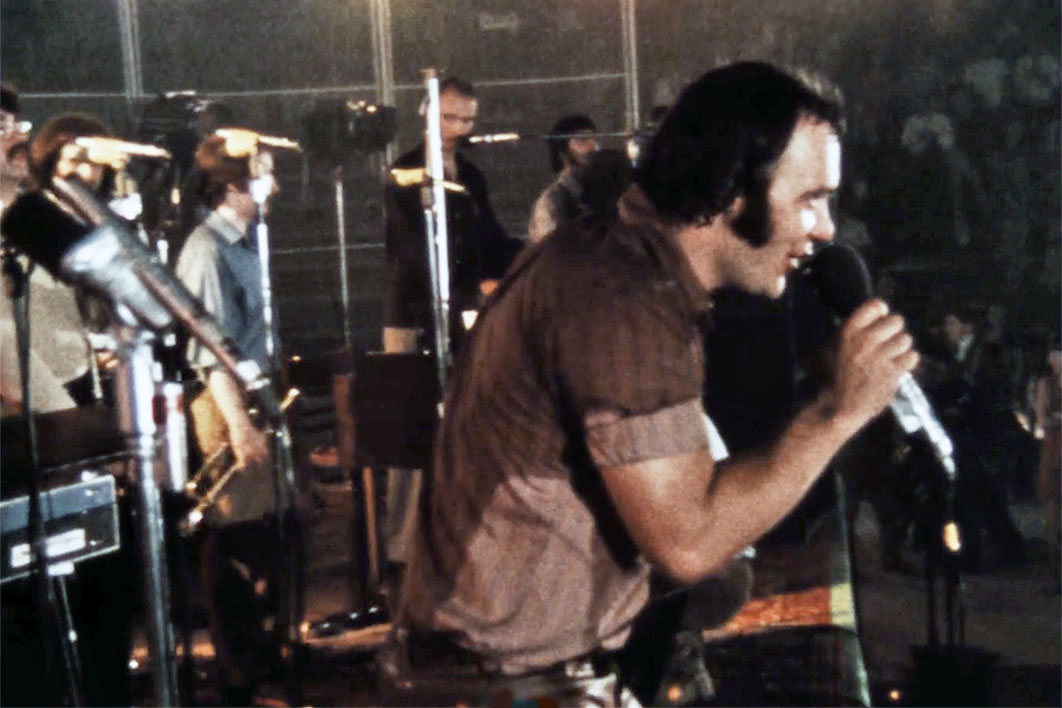You’ve had three hit singles, you’ve headlined at Woodstock, you’ve sold out Caesars Palace in Las Vegas and your album has just beaten Abbey Road for the Best Album Grammy. You’re the number one rock band in the world. So, what do you do next?
Well, obviously, you tour behind the Iron Curtain on a trip sponsored by that well-known popular music aficionado Richard Milhous Nixon.
Veteran documentarian John Scheinfeld’s new film, What the Hell Happened to Blood, Sweat & Tears?, tells the story of this unlikely expedition with pace and panache. What might have been a run-of-the-mill rock band biopic — a staple of the big streaming services — is made far more vital and interesting by its cold war angle.
It’s early 1970 and the nine-piece combo Blood, Sweat & Tears is at the peak of its powers. By fusing big-band jazz with a rock-and-roll ethos, these talented musicians have pioneered a new style of pop music, storming up the charts with songs like “Spinning Wheel,” “And When I Die” and “You’ve Made Me So Very Happy.”
As young men of their time, the band members oppose the war in Vietnam and see themselves as paid-up members of the counterculture. So why do they go into business with the US State Department and participate in a soft-power propaganda junket to promote American values in Yugoslavia, Poland and Romania?
Well, alongside a whirlwind horn section, the band’s powerhouse lead singer David Clayton-Thomas is at the heart of its appeal. And he turns out to be the band’s problem child.
As a Canadian, Clayton-Thomas needs a green card to work in the United States. Unfortunately he’d acquired a criminal record as a teenager and is on the verge of being deported.
Luckily BS&T is managed by a seasoned problem-solver called Larry Goldblatt. Though not in the same class as Allen Klein or Colonel Tom Parker, Goldblatt is a wily operator; in fact, he took over management of the band when he was serving time for passing dud cheques.
Goldblatt quickly negotiates a deal with Washington: BS&T will play Eastern Europe in exchange for a shiny new green card for Clayton-Thomas.
The Yugoslavian and Polish legs of the tour are interesting but not especially newsworthy. The real action takes place in the oppressive monochrome culture of communist Romania, a country run by the thoroughly unpleasant Nicolae Ceaușescu, who had hosted a visit by Nixon just the year before.
Romania is trying to run a foreign policy slightly independent of the Soviet Empire, and the United States is trying to encourage it. But many of the ordinary Romanians who attend BS&T’s two concerts aren’t interested in being diplomatic. They hate Ceaușescu and commit to turning the band’s performance into a political act if they can.
In a brilliant piece of research, the filmmakers hunt down Romanian fans — now in late middle age — who attended the first of BS&T’s two concerts. “The feeling of freedom it exuded was extraordinary,” explains one. Another says simply: “It was a revelation.”
The footage of the gig is both joyous and moving. One fan is seen clearly wearing symbolic manacles. But when these young Romanians start chanting “USA, USA,” you know things ain’t going to end well.
The regime says the first concert was “too successful” and demands changes: basically, tone it down or there will be consequences. The band and their audience have other ideas, and the second concert ends, inevitably, in mayhem. The authorities use dogs against the defenceless concertgoers. One fan asks for an autograph and is badly beaten — in front of the band — for his troubles.
As Clayton-Thomas says, “We have travelled in countries where certain repressions are a way of life, where people don’t enjoy the privilege of spontaneous outburst.”
When the band gets back to America they are caught between activists like Abbie Hoffman, who calls them “pig collaborators” for taking the State Department’s coin, and the avowedly anti-communist Nixon administration, which censors a documentary that was being made about their adventures because it might embarrass Ceaușescu.
Even fifty years later, though, the surviving members of the band look back in anger at the way they believe their reputations were trashed. As the director of that aborted documentary, Donn Cambern, says, “What happened to Blood, Sweat & Tears — it just wasn’t fair. They really got screwed.”
One of the very few criticisms I’d make of this impressive piece of work is that it misses the story’s afterlife.
Communism in Europe ended a bit like Hemingway’s famous description of bankruptcy’s arrival: “Gradually, and then suddenly.”
In December 1989, nineteen years after BS&T toured Romania, Nicolae Ceaușescu attempted to unify his fracturing nation by delivering a speech to a huge crowd in Bucharest.
Well aware of the anti-communist revolutions already taking place across Eastern Europe, the angry throng had gathered to oust the dictator, not to praise him. The famous live TV broadcast of the speech shows the expression on Ceaușescu’s face when he realises that something’s amiss.
He tries to quell the recalcitrant crowd, but they ignore him and continue to whistle and jeer. Ceaușescu suddenly looks like a confused old man rather than a Red potentate with power over life and death. The sound of the crowd in 1989 echoes the catcalls of the defiant Romanians who turned out to see BS&T all those years before.
A few days later, on Christmas Day, Ceaușescu is tried before a kangaroo court and executed by firing squad.
The sudden collapse of that regime has many complex causes — not least the nation’s abject economic failings — but maybe BS&T did indeed play a small part in the gradual decay of Romanian communism.
So, what the hell did happen to Blood, Sweat & Tears? Well, the music industry is tough — fashions change and bands fall out of favour — but politics can be even more brutal. •




